|
|
|
Sort Order |
|
|
|
Items / Page
|
|
|
|
|
|
|
| Srl | Item |
| 1 |
ID:
103817


|
|
|
|
|
| Publication |
New Delhi, IDSA, 2011.
|
| Description |
51p.
|
| Series |
IDSA occasional paper no. 17
|
| Standard Number |
9798186019871
|
|
|
|
|
|
|
|
|
|
|
|
Copies: C:2/I:0,R:0,Q:0
Circulation
| Accession# | Call# | Current Location | Status | Policy | Location |
| 055886 | 355.1/DIX 055886 | Main | On Shelf | General | |
| 055887 | 355.1/DIX 055887 | Main | On Shelf | General | |
|
|
|
|
| 2 |
ID:
090376
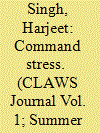

|
|
|
|
|
| Publication |
2008.
|
| Summary/Abstract |
The purpose of this article is to document the enormous variety of stressors that the modern commander might face. This Taxonomy should be useful for commanders to identify which types of stressor they are experiencing and which types they personally find difficult to manage. If they can do this, they are closer to knowing where they should focus their attention when trying to predict thein own stress reactions. It is then possibel to train to control both the stressor and one's reaction to it.
|
|
|
|
|
|
|
|
|
|
|
|
|
|
|
|
| 3 |
ID:
114023
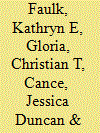

|
|
|
|
|
| Publication |
2012.
|
| Summary/Abstract |
Using the Broaden-and-Build Theory of Positive Emotions, the relationships among stress, positivity, and depressive symptoms were examined in a sample of military spouses during deployment (N = 367). Over one-third of the spouses reported moderately severe levels of depressive symptoms. After controlling for demographic and deployment variables, stress had a positive association with depressive symptoms (ß = .59, p < .001), while positivity had a negative association (ß = -.39, p < .001). Positivity was also found to play a moderating role on the relationship between stress and depressive symptoms (ß = -.29, p < .001). Spouses with lower positivity reported more depressive symptoms at both low and high levels of stress compared to those with higher positivity. The final model, including both direct and moderating variables, accounted for 69 percent of the total variance in depressive symptoms. Practical implications are discussed in terms of the importance of developing positivity in military spouses.
|
|
|
|
|
|
|
|
|
|
|
|
|
|
|
|
| 4 |
ID:
120621


|
|
|
|
|
| Publication |
2013.
|
| Summary/Abstract |
The rapid expansion of enrollment capacity in China's colleges since the late 1990s has come at the price of high tuition hikes. China's government has put forth financial aid programs to enable poor students to access higher education. Although studies have shown that poor high school students are indeed able to attend college when their test scores are high enough (that is, few are unable to attend when they are qualified to attend), the literature has not explored whether poor students have sufficient amounts of aid to thrive in college.
Using findings from a randomized controlled trial, this study evaluates the impact of providing full scholarships to students from poor rural areas (henceforth treatment students) on student stress levels, self-esteem/self-efficacy, and participation in activities in four first-tier colleges. To do so, we compare outcomes of the treatment students with students who were not given full scholarships by the project (and were left to search for scholarships and other sources of financial aid from the university system itself-the control students). The project was run among the 200 poorest first-year students in four first-tier colleges in inland China. Somewhat surprisingly, we find that treatment students (those receiving full scholarships from the project) were only slightly more successful in obtaining financial aid than control students. This suggests that control students (those who did not receive full scholarships from the project) were still able to access comparable levels of financial aid. Most importantly, scholarship recipients were statistically identical in outcome to control students in terms of stress, self-esteem, and participation in college activities, suggesting that poor students (who are dependent on aid from the university system) currently are able to access sufficient levels of financial aid, are able to take advantage of the activities offered at college, and do not shoulder heavy financial or psychological costs.
We find, therefore, that efforts of the government to alleviate the financial burden of college on the poor have been relatively successful in first-tier colleges. Because of this, foundations and individuals may decide that if they want to improve human welfare, giving additional scholarships at high tier colleges may be having little effect.
|
|
|
|
|
|
|
|
|
|
|
|
|
|
|
|
| 5 |
ID:
094817
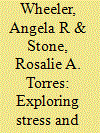

|
|
|
|
|
| Publication |
2010.
|
| Summary/Abstract |
Studies on active duty military families indicate that deployment disrupts normal functioning of the family. Scholars still, however, lack the necessary knowledge to fully grasp the impact that the current Iraq and Afghanistan wars have had on Army National Guard (ARNG) families who have experienced deployment. A grounded theoretical approach to interviews with ARNG spouses yields insight into how these families are coping with the often-unexpected event of wartime deployment. The authors identify stressors and coping strategies used by these spouses and offer suggestions for future research that will allow scholars to more fully understand the present situation ARNG families are facing.
|
|
|
|
|
|
|
|
|
|
|
|
|
|
|
|
| 6 |
ID:
186076
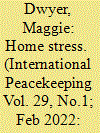

|
|
|
|
|
| Summary/Abstract |
Through the case of the Sierra Leonean deployment on the African Union Mission in Somalia (AMISOM), this study argues that family-related stress is an often-overlooked challenge in peacekeeping deployments. Using in-depth interviews with Sierra Leonean soldiers who were part of the deployment, military decision makers, and foreign advisors, this article lays out specific factors that created family-related tensions and contributed to lowered morale for Sierra Leonean peacekeepers. It demonstrates that the family-related stress on deployment is not only an issue of family separation, it is entangled with the historic trajectories of the armed forces and the sending country’s socio-economic conditions. The focus on Sierra Leone highlights the additional and unique burdens that soldiers and their families may endure in troop contributions from lower-income countries.
|
|
|
|
|
|
|
|
|
|
|
|
|
|
|
|
| 7 |
ID:
087232
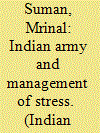

|
|
|
|
|
| Publication |
2009.
|
| Summary/Abstract |
Military's paraplegic rehabilitation (PRC) at Pune provides rehabilitation support to paraplegic and tetraplegic soldiers. Most of the inmates are victims of bullet or other injuries sustained during action in war and counterinsurgency operations. During 1990's a military delegation from a delegate wanted to know the suicide rate amongst the inmates. He found it difficult to believe that it was nill.
|
|
|
|
|
|
|
|
|
|
|
|
|
|
|
|
| 8 |
ID:
169096
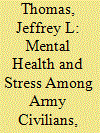

|
|
|
|
|
| Summary/Abstract |
When military community closure occurs, it can be challenging for service members and the surrounding community. Given that services and social networks disappear; this is particularly salient in overseas locations. Few studies have systematically assessed the impact of base closure on military community members. In the present study, 743 soldiers, 114 Army civilian employees, and 54 military spouses living in two closing U.S. military communities in Germany were surveyed about transformation stressors, mental health, and factors associated with better adjustment such as individual coping, leadership behaviors, and community cohesion. While individual coping was associated with fewer sleep problems, and individual coping and leadership were associated with less psychological distress, community cohesion generally overrode these effects in the final step of regression models. Thus, while coping and leadership are important, community connection appears to confer benefits to the affected individuals even in the context of base closure.
|
|
|
|
|
|
|
|
|
|
|
|
|
|
|
|
| 9 |
ID:
149139
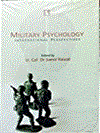

|
|
|
|
|
| Publication |
Jaipur, Rawat Publications, 2017.
|
| Description |
xx, 178p.hbk
|
| Standard Number |
9788131608425
|
|
|
|
|
|
|
|
|
|
|
|
Copies: C:1/I:0,R:0,Q:0
Circulation
| Accession# | Call# | Current Location | Status | Policy | Location |
| 058898 | 355.345/RAW 058898 | Main | On Shelf | General | |
|
|
|
|
| 10 |
ID:
088415
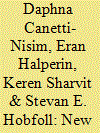

|
|
|
|
|
| Publication |
2009.
|
| Summary/Abstract |
Does exposure to terrorism lead to hostility toward minorities? Drawing on theories from clinical and social psychology, we propose a stress-based model of political extremism in which psychological distress-which is largely overlooked in political scholarship-and threat perceptions mediate the relationship between exposure to terrorism and attitudes toward minorities. To test the model, a representative sample of 469 Israeli Jewish respondents was interviewed on three occasions at six-month intervals. Structural Equation Modeling indicated that exposure to terrorism predicted psychological distress (t1), which predicted perceived threat from Palestinian citizens of Israel (t2), which, in turn, predicted exclusionist attitudes toward Palestinian citizens of Israel (t3). These findings provide solid evidence and a mechanism for the hypothesis that terrorism introduces nondemocratic attitudes threatening minority rights. It suggests that psychological distress plays an important role in political decision making and should be incorporated in models drawing upon political psychology.
|
|
|
|
|
|
|
|
|
|
|
|
|
|
|
|
| 11 |
ID:
103816
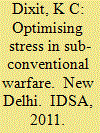

|
|
|
|
|
| Publication |
New Delhi, IDSA, 2011.
|
| Description |
41p.
|
| Series |
IDSA occasional paper no. 16
|
| Standard Number |
9798186019855
|
|
|
|
|
|
|
|
|
|
|
|
Copies: C:2/I:0,R:0,Q:0
Circulation
| Accession# | Call# | Current Location | Status | Policy | Location |
| 055884 | 355.02/DIX 055884 | Main | On Shelf | General | |
| 055885 | 355.02/DIX 055885 | Main | On Shelf | General | |
|
|
|
|
| 12 |
ID:
080825
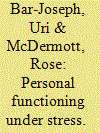

|
|
|
|
|
| Publication |
2008.
|
| Summary/Abstract |
Much work has explored decision making under stress in political leadership. Less work has attempted to link the enormous emotional pressure of crisis with both the heightened sense of political accountability and responsibility and the increased need for social support under such circumstances. The authors examine the impact of political accountability, and the nature and quality of individual social support, on the relative performance of five central Israeli leaders on the second day of the Yom Kippur War. Minister of Defense Moshe Dayan and the Commander of the Southern Command, Maj. Gen. Shmuel Gonen, performed very poorly, whereas Prime Minister Golda Meir and Chief of Staff Lt. Gen. David Elazar performed very well. The Commander of the Northern Command, Maj. Gen. Yitzhak Hofi, performed adequately. The authors account for these divergences in performance based on individual differences in personal accountability and available social support networks.
|
|
|
|
|
|
|
|
|
|
|
|
|
|
|
|
| 13 |
ID:
115639
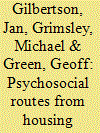

|
|
|
|
|
| Publication |
2012.
|
| Summary/Abstract |
Over the past decade the Warm Front Scheme has been the English Government's principal programme for improving domestic energy efficiency and reducing fuel poverty. This paper reports on a cross-sectional survey of low income householders participating in the Warm Front Scheme in five urban areas of England. Surveys were conducted of 2685 individuals, before and or after intervention. Pathways to self reported health were modelled by logistic regression. Of all the dimensions of health examined, only self reported mental health is directly associated with Warm Front measures. Intermediary variables associated with Warm Front intervention were shown to be significantly correlated with more dimensions of self reported health status. Higher temperatures, satisfaction with the heating system, greater thermal comfort, reductions in fuel poverty and lower stress were significantly correlated with improved health. Alleviating fuel poverty and reducing stress appeared to be the main route to health. We conclude there are complex and indirect relationships linking energy efficiency measures to outcomes on all dimensions of health which contribute to significant material and psychosocial benefits. The impact of the Warm Front Scheme cannot be fully understood by a limited analysis which merely relates indoor temperature and property characteristics to physiological health outcomes.
|
|
|
|
|
|
|
|
|
|
|
|
|
|
|
|
| 14 |
ID:
094142
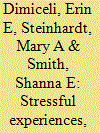

|
|
|
|
|
| Publication |
2010.
|
| Summary/Abstract |
A survey of military wives (N = 77) identifies their most stressful experiences, self-appraised control over these stressors, and coping strategies used. The authors examine two competing hypotheses: the goodness-of-fit hypothesis that the effects of problem-focused coping (PFC) and emotion-focused coping (EFC) strategies on distress are moderated by the appraised controllability of the stressor, and the main-effects hypothesis that PFC strategies are more effective than EFC strategies in reducing distress regardless of appraisal of controllability. Wives identified deployment of soldiers as their most stressful experience, and reported using PFC strategies more frequently than EFC strategies. EFC strategies were predictive of greater physical symptoms of illness, while PFC strategies were related to reduced physical symptoms of illness only when military wives' perceived control of the situation was low. PFC strategies and controllability were significantly related to decreased depressive symptoms; EFC was marginally related to increased depressive symptoms, lending greater support to the main-effects hypothesis.
|
|
|
|
|
|
|
|
|
|
|
|
|
|
|
|
| 15 |
ID:
160975
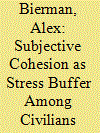

|
|
|
|
|
| Summary/Abstract |
Recent research shows that civilians who work with the military in war zones are often exposed to life-threatening situations that can create psychological distress. In this study, we examine whether cohesion buffers the relationship between threat and psychological distress. Using a probability sample of civilians working with the U.S. Army in Iraq and Afghanistan, we find that cohesion buffers the relationship between threat and both internalizing and externalizing forms of emotional distress, but does so nonlinearly, with buffering observed at moderate but not high levels of cohesion. This research shows that cohesion may be an important resource for the mental health of civilians working in war zones but also supports sociological theory positing that the utility of social resources for individual well-being may be obviated in tightly integrative social contexts.
|
|
|
|
|
|
|
|
|
|
|
|
|
|
|
|
| 16 |
ID:
190780
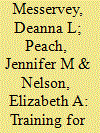

|
|
|
|
|
| Summary/Abstract |
Military ethics training has tended to focus on imparting ethical attitudes and on improving deliberative moral decision-making through classroom instruction. However, military personnel can be exposed to extreme conditions on operations, which can lead to heat-of-the-moment thinking. Under stress, individuals are more likely to engage in automatic processing than deliberative processing, and visceral states such as anger and disgust can increase a person’s risk of behaving unethically. We propose that military ethics training could be improved by reinforcing classroom ethics training with interventions to counteract these risk factors. As training interventions, we recommend incorporating affect-labeling, goal-setting, and perspective-taking into realistic, pre-deployment training to make moral decision-making more robust against stress and other emotional experiences typical in combat. We outline steps researchers and trainers can take to test whether these interventions have the desired impact on ethical behavior.
|
|
|
|
|
|
|
|
|
|
|
|
|
|
|
|
|
|
|
|
|